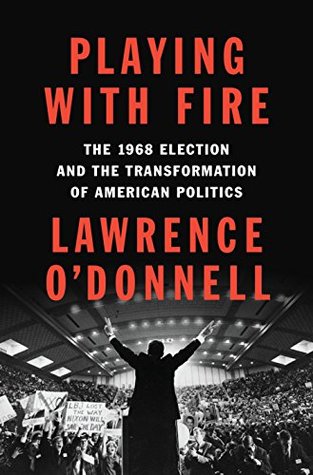More on this book
Community
Kindle Notes & Highlights
Read between
November 8 - November 15, 2017
Tragedy has many faces but none quite like a general crying, saluting his son’s coffin.
’64 presidential campaign. LBJ won the election by the largest popular majority to that point in American history.
Campaign books like this one were not meant to be read beyond the title. The political press regarded To Seek a Newer World as the first draft of Bobby’s bumper sticker.
The media saw the lifted shirt as the crudest moment in the modern presidency. It would not be outdone until Donald Trump moved into the White House.
Reagan and Trump were underestimated for the same reason: they were both TV stars trying to be taken seriously as national politicians.
Some people, Reagan joked, “can’t see a fat man standing beside a thin one without automatically concluding the fat man got that way by taking advantage of the thin one.”
Eugene McCarthy was the last American presidential candidate who thought flattering an audience’s intelligence was the way to win their hearts and their votes.
“Like anybody, I would like to live a long life. Longevity has its place. But I’m not concerned about that now. I just want to do God’s will. And He’s allowed me to go up to the mountain. And I’ve looked over. And I’ve seen the Promised Land. I may not get there with you. But I want you to know tonight, that we, as a people, will get to the promised land! And so I’m happy, tonight.” These were the last words publicly spoken by Martin Luther King Jr.
Everything is predictable because we have everything under control. That confidence means the establishment is always the last to know that it has lost control of a process that it created, like nominating a presidential candidate.
The last person Rosey Grier protected that night was the man who’d shot Bobby Kennedy.
“Write what he means, not what he says.”
Fannie Lou Hamer, who once said, “I’m sick and tired of being sick and tired,”
as they say in the Senate, revise and extend his remarks
The next day McCarthy phrased his endorsement as only he could: “I’m voting for Humphrey and I think you should suffer with me.”
In the nuclear age, the awe for the office and the man continued to increase to the point where the job title had changed to leader of the free world, a description that has never been true and never been doubted by voters, the press, or people working in the White House.
One definition of the perfect crime is a crime the authorities are afraid to prosecute. Richard Nixon knew he had committed the worst crime in American political history—a crime that arguably cost more than twenty thousand American soldiers their lives by extending the war. And he also knew it was the perfect crime. Richard Nixon knew what Lyndon Johnson, Clark Clifford, and Dean Rusk would decide to do when faced with no good choice. Nothing. For the good of the country.
Richard Nixon addressed the nation from the Oval Office at 9:01 p.m. on August 8, 1974, and said something no president before or since has said: “I shall resign the Presidency at noon tomorrow.”
President Ford said, “My fellow Americans, our long national nightmare is over.”
For the rest of his life President Ford carried in his wallet a quote from a 1915 Supreme Court decision saying a pardon “carries an imputation of guilt and acceptance of a confession of it.”
In 1981, Gerald Ford told Henry Kissinger, “Sometimes I wish I had never pardoned that son of a bitch.”
Ronald Reagan’s winning campaign slogan in 1980 was “Make America Great Again.” Donald Trump chose those exact words as his winning slogan thirty-six years later.
“And we are asking Americans to think about that because how do you ask a man to be the last man to die in Vietnam? How do you ask a man to be the last man to die for a mistake?” No more powerful question about Vietnam was ever asked in Washington. The answer came four years later as the North Vietnamese closed in on Saigon.
During the Nixon years, 21,195 Americans were killed in Vietnam, bringing the total to 58,315.


